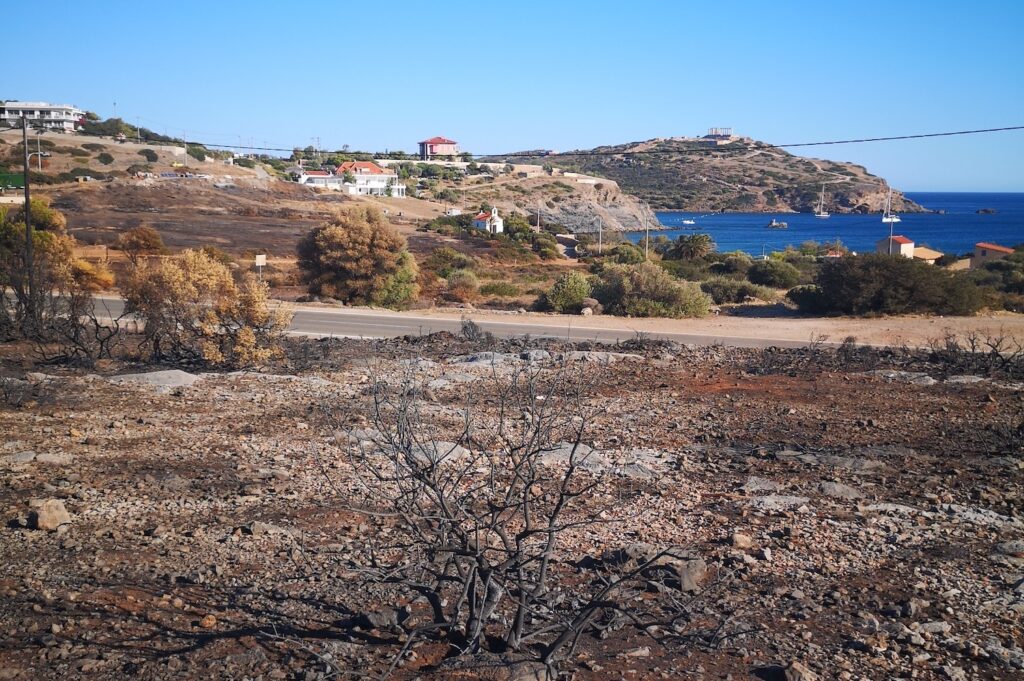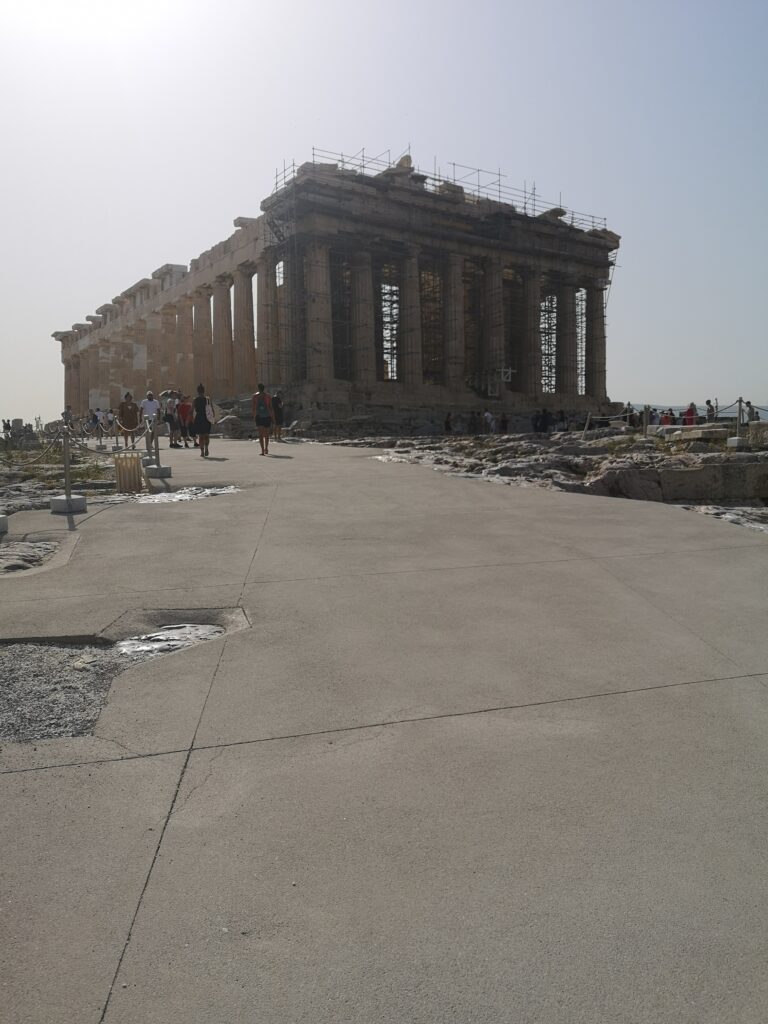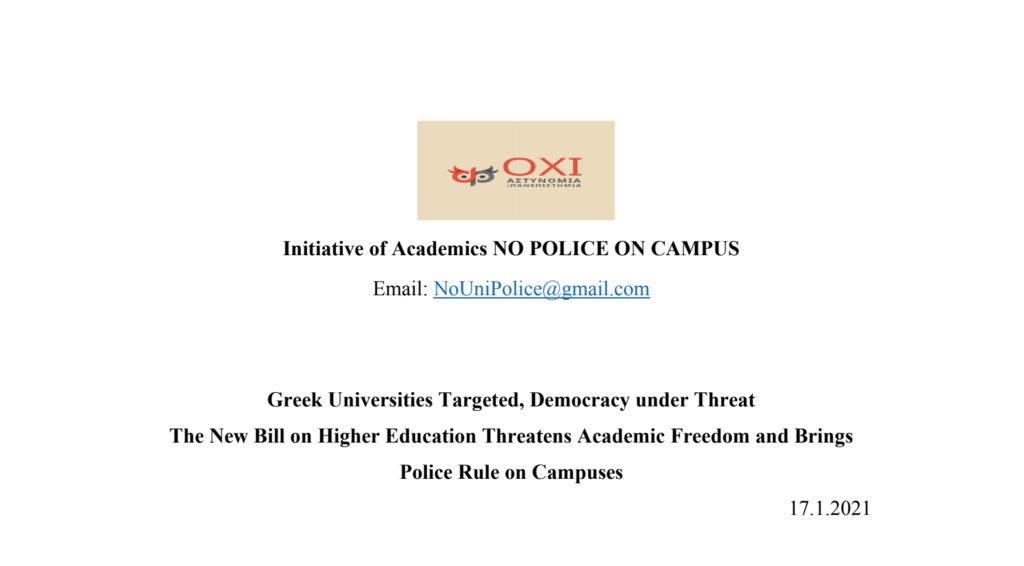On March 1st 2023, an impromptu protest rally took place outside the headquarters of Greece’s only railway company, Hellenic Trains (HT). HT is the passenger carrier of the recently privatized and formerly publicly owned carrier of Hellenic Organization of Railways. The word ‘Assassins’ and the phrase ‘Your profits, our deaths’ were written on the walls of the headquarters amidst clashes with the police.
On the morning of that day, Greece had woken up to devastating news. During the night, a passenger train headed to Thessaloniki from Athens, mostly carrying students, collided with a freight train traveling in the opposite direction. The collision was so fierce that the first two wagons were literarily pulverized, leaving 57 dead. As it turned out, an inexperienced Stationmaster with limited equipment at his disposal had manually put the two trains on the same track by mistake. For a full twelve minutes, passengers and personnel on both trains were on collision course without any human or non-human intelligence detecting it. In the following days much more serious and larger rallies and riots followed.
‘Mitsotakis, fuck you!’ – the original condition
The crowd, amongst others, was chanting a melodic slogan ‘Mitsotakis, fuck yοu!’. This vulgar slogan had first emerged during the big forest fires of 2021 when the wooded northern region of Evia Island and the forests of Parnitha mountain in the north of Athens had been abandoned to burn due to a peculiar “general evacuation” policy. New Democracy, the conservative governing party, had won the elections of 2019 to an extent by utilizing another horrible catastrophe, the fires of Eastern Attica in 2018. At that time, New Democracy blamed the governing SYRIZA party for failing to save the lives of the 103 who died in the fire. However, instead of trying to reinforce the civil protection infrastructures and increase the budget for fire brigades and forestry service, New Democracy has preferred to recruit a few thousand new police officers and thus enforce a heavy policing of forest fires. With the new policy, entire municipalities are evacuated by force so as to avoid deaths by all means in order to come out with a lower body count than the previous government.
The consequence of this policy of evacuation and abandonment was not only the destruction of forests, but also of agricultural land, flocks of animals, bees and entire villages that burned to ashes as nobody was there to protect them (on the fires and the archaeological heritage see Poulimenakos & Dalakoglou 2021 in FocaalBlog). As TV channels sent their crews to report from the evacuated towns and villages of Evia, someone videobombed a live broadcast and stood behind the reporter shouting, ‘Mitsotaki, fuck you!’, in a spontaneous expression of anger towards the evacuation policy that had destroyed his livelihood. Soon, “Mitsotakis, fuck you!”, became a slogan with a melody, chanted by football fans during games and by audiences at music concerts. To understand the rapid nationwide spread and popularity of this anthem, we now take a closer look at the New Democracy government record.
The Mitsotakis government had applied the same principle of minimum death tolls at any cost during the Covid-19 pandemic by enforcing one of the hardest lockdowns in the western world with curfews and severely restricted mobility under state surveillance. For many months, every citizen had to send a text message to the Ministry of Interior Affairs and give a “valid” reason before leaving their house. Defectors were heavily fined by the police. As with the forest fires, now the systematic destruction of health care infrastructures under the austerity regime imposed after the financial crash was offset by calling in the police as a civil protection mechanisms and the government’s main tool for controlling the pandemic.
“Mitsotakis, fuck you!” – the current condition
These structural continuities of policing (rather than resolving) an infrastructural crisis explain why one week after the train crash tragedy, on March 8th, Greece saw the biggest popular mobilization since the 2010-2015 era of insurrections against the imposition of structural adjustment programs by the IMF-EU-ECB troika. The main rallying cry of the protests was the phrase “text me when you get there”, a reference to the overprotective Greek family relations symbolized by frequent parental requests to send messages when travelling (even for over-30s). Now used by the protesters, the phrase is a tragic and powerful reference to mourning parents who will never receive a reply from their children who were on the train.

The protests were so massive and persistent that they forced the Prime Minister to postpone the upcoming elections for an undetermined period. Meanwhile, the government’s political communication experts massively underestimated the train tragedy’s impact on Greek public opinion. Mitsotakis’ initial government statement blamed the accident on the stationmaster and omitted any reference to years of chronic under-investment in traffic infrastructures during the privatization of the railway company. This only increased public anger. An alliance of trade unions declared a general strike, whilst pupils occupied their schools and students their universities. Within five days, the government’s public relations experts advised Mitsotakis to accept partial responsibility to calm things down. Yet again the obnoxiousness and arrogance of the PM and his cabinet led to another PR catastrophe when Mitsotakis stated that the 57 victims of the train crash had ‘sacrificed’ themselves in order to improve national railways, flanked by the Minister for Development who called the 57 deaths ‘an opportunity’ for the country. With no time left for the government or the railway company to come up with another damage control strategy, people on social media, in neighborhoods and work places saw the train crash as an emblem of the precarization of everyday life after more than 13 years of extreme neoliberal government budget cuts.
“Don’t you dare to put the blame on an isolated human error”, or, “we live by chance in this country”, and, “this was not an accident but a murder”, were popular expressions that linked mourning and anger with a demand for exposure of underlying causes of the incident such as chronic degradation of railway infrastructures, budget cuts, staff shortages, lack of automated security systems that could correct human errors and prevent accidents. The poor state of other hard infrastructures came to light, contradicting the neoliberal mantra that service standard would skyrocket after privatizations. The German-owned airports in Greece’s peripheral cities suffer from staff and electronic equipment shortages while foreign equity investment in the Chinese-owned port of Piraeus never reached the promised level. The carefully crafted hegemonic narrative of private sector supremacy over the old state-controlled economy that had gradually gained control of hearts and minds (Mavris 2017) since the Greek crisis fell apart like a house of cards. Recent opinion polls show a reversal of political preferences with the ruling party losing significant ground amongst a general decline of trust in capitalist democracy.
Greece’s Inverted Shock Doctrine
What is happening in Greece today seems to be the exact opposite of what Naomi Klein argued in her stellar book on the “Shock doctrine” (2007). According to Klein, the severity of an immense collective trauma leads to numbness and disorientation that freezes collective action and presents excellent opportunities for the ruling classes to impose otherwise highly unpopular policies. In Greece, disorientation and numbness characterized society during the long period of inflation, privatizations, budget cuts, and impoverishment since 2008. Yet, these processes seemed abstract, confusingly linked to both local and global economic processes, and, hence, difficult to pinpoint in space and time. That vagueness certainly ended with the collective trauma of the train crash. The tragic crumble of a very material and tangible element of public transport infrastructure, similar to the earlier case of the Evia Island forest fires, turned into a metonymy for the crumbling relations between the Greek public, society, on the one hand, and the alliance of private capital and the state apparatus on the other hand. As we know from ethnographic research, “infrastructures are a principle materialization of the relationship between people (citizens and non-citizens alike) and otherwise abstract state and supra-state authorities” (Dalakoglou 2016:823). Infrastructures consist of the realm where the social contract between a state and its citizenry is taking tangible forms and is felt in the everyday life. It is the realm where the game of hegemony is most likely to be gained or challenged (Srnicek 2014).
Another crucial dimension of the conjuncture within which the massive mobilizations against the state-capital ruling class alliance now take place is that in recent weeks Greeks learned that for the first time in history residential properties are no longer protected by law from dispossession even at rather insignificant household debt levels. The Greek Supreme Court recently ruled in favor of private equity funds, allowing property auctions to redeem household loans purchased from banks as initial lenders, leaving hundreds of thousands who have struggled to repay their mortgages in despair about their future and another crucial aspect of the national social fabric in distress.
The residential house in Greece is more than bricks and mortar that put a roof over one’s head. It represents intra-generational solidarity and strong family bonds, with parents struggling to buy a house to provide economic security for their children. In other words, the house represents a form of informal social security provided by the family rather than the state. Typical to the substitution of an absent welfare state with informal family solidarity in Mediterranean societies, Greece never had significant numbers of council housing like the UK for example. Family solidarity provided a safety net in difficult times and certainly so during the recent 13-years long crisis with people in their 30s or even 40s living with their parents or grandparents.
Infinite density and the specificity of neoliberal austerity
We argue that the tragic train crash made visible the specific and tangible failure of public infrastructure and thus gave austerity specificity in time and space. The disaster encapsulates an “infinite density” of societal deadlock between the protagonists of privatization and austerity on the one hand and the very fabric of the social contract in Greece on the other hand, in which every form of social consensus is collapsing. With the neoliberal state’s privatized public services failing to fulfill the promises of upgraded public infrastructures to the benefit all and the informal forms of social reproduction gradually dismantled, the Greek nation-state moves towards a power vacuum. It is no coincidence that the majority of protesters are young people from the so-called generation z. This generations feels that all aspects of the social contract are expiring and they will not enjoy the benefits and stability of the public sector that their parents had. Instead, they will have low-paid jobs in the private sector and will probably not inherit a house to live in because they cannot afford to pay the increased inheritance taxes (Knight 2018) or because their parent’s house will be disposed by private equity funds. The train accident made shockingly evident that in today’s Greece even a routine train journey is not safe, that nobody “is there” for the people. “We live by chance in this country”, one of the protest slogans states.
Yet, a careful observer of public transport users after the train disaster sees this realization of state negligence turn into an increased care for each other. People now help older passengers and others in need on and off busses in the absence of special ramps. They talk to each other and give courage to each other for the day ahead while ranting against the government (perhaps even using the public slogans discussed in this article). “We are the infrastructures” is what we are often told during recent ethnographic research. Maybe this new confidence will create a vision of new social organization beyond the state, capital and also beyond the family. One new slogan points in this direction; “Mono o laos tha sosei ton lao” (“only people can save the people”).
References
Dalakoglou, D. (2016) “Infrastructural gap: Commons, State and Anthropology. City, 20:6, 822-831, DOI: 10.1080/13604813.2016.1241524.
Dalakoglou, D. and Poulimenakos, G. (2021). “The Past is on Fire: Wildfires, (Un)imagined Communities and the Shift to the Tourism of the 1%.” FocaalBlog, 30 September. https://www.focaalblog.com/2021/09/30/dimitris-dalakoglou-georgos-poulimenakos-the-past-is-on-fire/
Klein, N. (2007) The shock doctrine: the rise of disaster capitalism. London: Allen Lane.
Knight , D M 2018 , “The desire for disinheritance in austerity Greece “, Focaal , vol. 80 , pp. 30-42 . https://doi.org/10.3167/fcl.2018.800103
Mavris, G. (2017) “The Rise of Conservatism: Political Ideologies in Greece after the Memorandum” (in Greek), available online at https://www.mavris.gr/4943/political-ideology/.
Srnicek, N. (2014) “Infrastructures and Hegemony: The Matter of Struggle” in Fall Semester. Available at https://static1.squarespace.com/static/56ec53dc9f7266dd86057f72/t/581f3f704402439b560ff0b4/1478442864809/BookletNS.pdf
Dimitris Dalakoglou is Professor of Social Anthropology at Vrije Universiteit Amsterdam. He is director and PI of the research project infra-demos (funded from NWO-Vidi grant) and co-director of the Lab on Infrastructures Sustainability and the Commons.
Giorgos Poulimenakos holds a Bachelor’s degree in Social Anthropology from Panteion University and a MA from University of Sussex, UK. He is currently a PhD fellow in the ERC-funded project PORTS, based in the department of social anthropology of the University of Oslo. He is investigating the increasing significance of ports and maritime logistics in globalized, contemporary capitalism through the case study of Piraeus, an emerging Greek port in the global market bought recently by Chinese interests.
Cite as: Dalakoglou, Dimitris & Poulimenakos, Giorgos 2023. “Disaster Infrastructures and the Inverted Shock Doctrine in Greece” Focaalblog 14 April. https://www.focaalblog.com/2023/04/14/giorgos-poulimenakos-dimitris-dalakoglou-disaster-infrastructures-and-the-inverted-shock-doctrine-in-greece/



